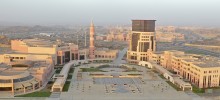The use of Arabic language in lectures affects the students' fluency in English Language.

A study conducted by a faculty member in King Khalid University (KKU) at the English Department of Science and Arts Faculty for Girls in Mahayel, Dr. Mona Mustafa, has revealed that the use of the Arabic language in lectures affects the students' fluency in communicating in English language. Dr. Mona also added, "Students do not have enough confidence to speak in English in public."
The study aimed to uncover the factors that have negative effects on English speaking skills in girls' colleges in the southern region of the Kingdom of Saudi Arabia. The study assessed and analyzed the effects of faculty members, students, curricula and textbooks, teaching methods, and the learning environment. The researcher used the descriptive analytical method to get the results that have been analyzed by statistical means. Dr. Mona also used the statistical package (SPSS) to find Pearson coefficients and used the form of a questionnaire to students, and interview for faculty members to gather information. She distributed 150 questionnaire forms to the students of the Arts and Sciences Faculties for Girls in Majardah and Mahayel. She also interviewed 10 faculty members of the two faculties.
Results of the study proved that the use of the Arabic language in lectures affects negatively, the students fluency of communicating in the English language, and the students have no confidence to speak in English in public. The study also found out that the students can not conduct a telephone conversation in English without resorting to literal translation. Dr. Mona Mustafa also added that listening and speaking curricula contain more listening exercises than speaking exercises. Added to that, faculty members do not use enough exercises to develop public speaking.
Results of the study revealed that the time given to listening exercises is larger than time granted to exercises that improve speaking skills, and language labs are not used to teach listening and speaking skills. In addition, the number of female students in the section is more than 30 students. The results revealed another reason for the students' lack of fluency in the English language, which is that they do not use CDs as a model to improve speaking skills.
The study recommended not allowing students to use the Arabic language within lectures, in contrary, students should be encouraged to speak in English. Teachers could rely on different teaching strategies such as discussing social and cultural topics and the use of seminars to develop speaking and public speaking skills of the students. The study also stressed on the use of language labs for practicing exercises that would improve speaking skills. It is also recommended, according to the study, to increase time allocated to listening and speaking exercises - to six hours instead of the three hour. Furthermore, English clubs should be activated, taking care not to increase the number of female students to more than 30 students in listening and speaking courses.









